Ecosystems provide benefits and services that are essential to human survival including food, water, clean air, and building materials. Healthy ecosystems can help protect communities from the impacts of extreme events like flooding, heat, drought, and wildfire; as well as provide recreational and employment opportunities.
It is critical that communities incorporate ecosystem services into their land use planning in order to increase local and regional resilience. Green infrastructure, farm and forest preservation, and natural resource protection are strategies communities can use to include ecosystem services in their planning.
Scroll down to browse all Ecosystem Services resources, or filter by the subcategories listed below.
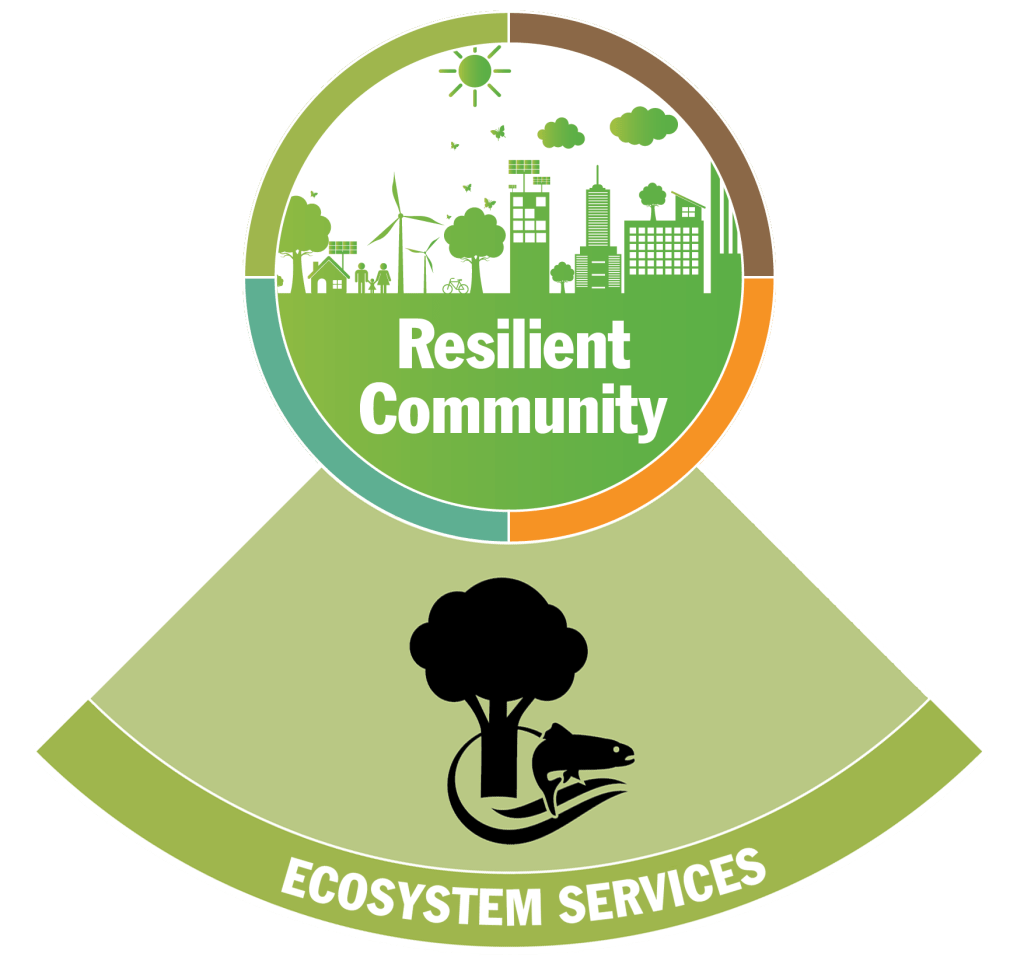
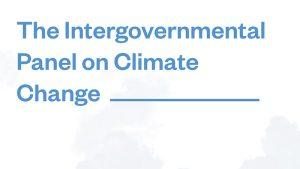
2022 IPCC
The Intergovernmental Panel on Climate Change’s official website provides reports, information on its working groups, activities, news, and updated calendar.
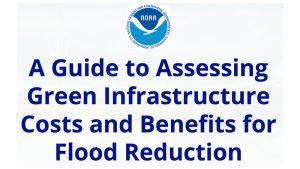
A Guide to Assessing Green Infrastructure Costs and Benefits for Flood Reduction
This guide provides a process that communities can use to assess the costs and benefits of green infrastructure to reduce flooding.

American Resilience Project: Farm Free or Die
“Farm Free or Die,” a film by American Resilience Project, advocates for transformative agricultural policies that improve farming livelihoods and address the climate crisis.
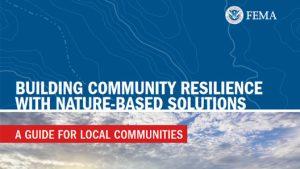
Building Community Resilience With Nature-Based Solutions
This guide helps communities identify and engage the staff and resources that can be used to implement nature-based solutions to build resilience to natural hazards, which may be exacerbated by climate change.
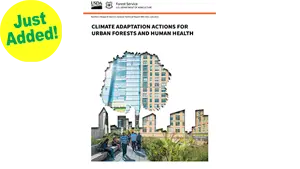
Climate Adaptation Actions for Urban Forests and Human Health
This report synthesizes adaptation actions to address climate change in urban forest management and promote human health and well-being through nature-based solutions. It compiles and organizes information from a wide range of peer-reviewed research and evidence-based reports on climate change adaptation, urban forest management, carbon sequestration and storage, and human health response to urban nature.
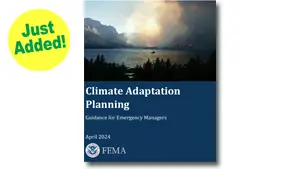
Climate Adaptation Planning: Guidance for Emergency Managers
FEMA’s Climate Adaption Planning: Guidance for Emergency Managers is intended to help state, local, tribal, and territorial (SLTT) emergency managers incorporate climate adaptation into emergency management planning efforts.
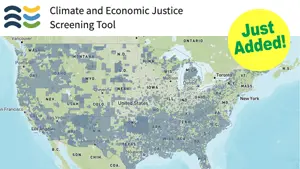
Climate and Economic Justice Screening Tool
The Climate and Economic Justice Screening Tool from the Council on Environmental Quality features an interactive map and uses datasets that are indicators of burdens in eight categories: climate change, energy, health, housing, legacy pollution, transportation, water and wastewater, and workforce development.
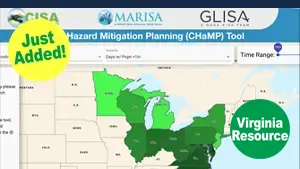
Climate and Hazard Mitigation Planning (CHaMP) Tool
CHaMP provides users with a single point of access to county-, state- and region-specific historical climate and hazard data and projected climate information.
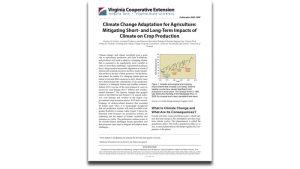
Climate Change Adaptation for Agriculture: Mitigating Short- and Long-Term Impacts of Climate on Crop Production
The Virginia Polytechnic Institute and Virginia State University produced this publication in 2014 outlining climate-related challenges facing agriculture and some options for mitigating and adapting to them. Included in the publication are adaptation strategies and conservation techniques touching on soil water-holding capacity, tillage, crop rotations, drainage, irrigation, nitrogen use, and buffers.
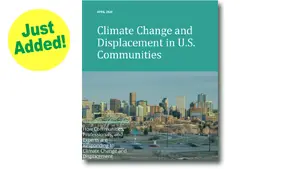
Climate Change and Displacement in U.S. Communities
EcoAdapt conducted a survey with the Strong, Prosperous, and Resilient Communities Challenge to determine if and how people working to address displacement pressures are considering the effects of climate change. This survey is part of a broader project in collaboration with the Urban Displacement Project to better understand the intersections between climate change and displacement pressures.

2022 IPCC
The Intergovernmental Panel on Climate Change’s official website provides reports, information on its working groups, activities, news, and updated calendar.

A Guide to Assessing Green Infrastructure Costs and Benefits for Flood Reduction
This guide provides a process that communities can use to assess the costs and benefits of green infrastructure to reduce flooding.

American Resilience Project: Farm Free or Die
“Farm Free or Die,” a film by American Resilience Project, advocates for transformative agricultural policies that improve farming livelihoods and address the climate crisis.

Building Community Resilience With Nature-Based Solutions
This guide helps communities identify and engage the staff and resources that can be used to implement nature-based solutions to build resilience to natural hazards, which may be exacerbated by climate change.

Climate Adaptation Actions for Urban Forests and Human Health
This report synthesizes adaptation actions to address climate change in urban forest management and promote human health and well-being through nature-based solutions. It compiles and organizes information from a wide range of peer-reviewed research and evidence-based reports on climate change adaptation, urban forest management, carbon sequestration and storage, and human health response to urban nature.

Climate Adaptation Planning: Guidance for Emergency Managers
FEMA’s Climate Adaption Planning: Guidance for Emergency Managers is intended to help state, local, tribal, and territorial (SLTT) emergency managers incorporate climate adaptation into emergency management planning efforts.

Climate and Economic Justice Screening Tool
The Climate and Economic Justice Screening Tool from the Council on Environmental Quality features an interactive map and uses datasets that are indicators of burdens in eight categories: climate change, energy, health, housing, legacy pollution, transportation, water and wastewater, and workforce development.

Climate and Hazard Mitigation Planning (CHaMP) Tool
CHaMP provides users with a single point of access to county-, state- and region-specific historical climate and hazard data and projected climate information.

Climate Change Adaptation for Agriculture: Mitigating Short- and Long-Term Impacts of Climate on Crop Production
The Virginia Polytechnic Institute and Virginia State University produced this publication in 2014 outlining climate-related challenges facing agriculture and some options for mitigating and adapting to them. Included in the publication are adaptation strategies and conservation techniques touching on soil water-holding capacity, tillage, crop rotations, drainage, irrigation, nitrogen use, and buffers.

Climate Change and Displacement in U.S. Communities
EcoAdapt conducted a survey with the Strong, Prosperous, and Resilient Communities Challenge to determine if and how people working to address displacement pressures are considering the effects of climate change. This survey is part of a broader project in collaboration with the Urban Displacement Project to better understand the intersections between climate change and displacement pressures.
